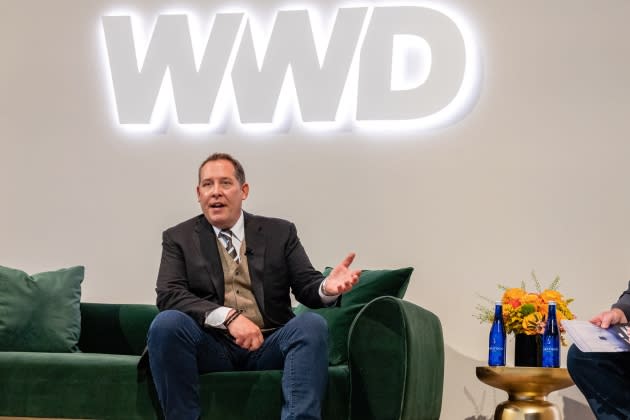First Insight Inc. Discusses Retail Data, Disconnects and Decade-defining Events

Retailers are bracing themselves for an unpredictable holiday season in regard to consumer spending, and according to First Insight Inc., the predictive analytics solution provider, there are human-bias-related disconnects retail executives may be overlooking that could thwart successful business outcomes.
At WWD’s annual Apparel & Retail CEO Summit, held on Oct. 25 and 26 at Cipriani South Street in New York, Greg Petro, chief executive officer of First Insight, and Arthur Zaczkiewicz, an executive editor of Strategic Content Development at WWD, took the stage to discuss a just-released survey of executive leaders and consumers. The research, done in partnership between First Insight and WWD, gauged the sentiment of consumers regarding inflation and spending and then queried executives on what they think consumers are thinking about those topics. The survey zeroed in on what retail executives are planning for the year ahead, among other topics.
More from WWD
[CLICK HERE to download the report]
During the fireside chat, titled “Thinking Around Corners: Bridging the Mindset Disconnect Between Shoppers and Retailers,” Petro put the research into better context by sharing a few of the “decade-defining events” he’d experienced throughout his career, which included being a retailer, and how the industry regularly faces macroeconomic and geopolitical events that challenge business. This includes recessions, wars and more recently, a pandemic.
“And if the expectation is that we’re going to have a frequency of dynamic events occurring in the future, what can you do about it?” Petro said, adding that CEOs are drained and tired and “spent from the amount of nimbleness that is necessary for pivoting an organization to deal with each one of these events.”
On top of that, as the report shows, there’s a disconnect between what consumers think and what retail executives think they think. When Zaczkiewicz asked which disconnect data point stood out most, Petro said it was shocking that at a high level, there’s about a 40 percent disconnection between concerns over the recession, inflation and other factors. Petro said it was interesting that “as you got more granular into categories — like home, jewelry and handbags — the disconnects became even higher, like nearly 100 percent, in some cases as much as 125 percent.”
And notably, 77 percent of retail executives said they are “moderately to extremely concerned” about recession, while only 57 percent of consumers expressed the same concern, the report said.
Zaczkiewicz asked what retailers could do to fix the disconnects while navigating unexpected macroeconomic challenges. Petro replied that “when we started the company back in 2007, that concept was new and wild. We asked, ‘Can consumers actually share data that’s going to affect decision-makers?’ I think as time has moved on — as we’ve seen in the presentations today, and the collection of data — the idea that we’re better at engaging consumers seems very natural. So that’s a very organic, positive thing for our industry, and I think it is going to be one of the key elements of long-term future success.“
There are also factors to strengthen the competitive advantages for retailers, Petro noted. “If you can anticipate, then you’re going to win,” he said. “It’s like gaming theory; the idea of different outcomes and likely what we’re going to do. You then start to weigh the idea of which one is more likely than the other. Anticipation is number one.”
Zaczkiewicz then noted that many of the macroeconomic challenges retailers face are out of their ability to control — such as inflation, war, supply chain disruptions and workforce shortages. “But what do they have control over?” he asked Petro.
“Price and pricing strategy,” Petro said. “But retailers lower prices when they don’t need to. The consumer isn’t expecting discounts, and while price can become a lever of demand and success, you have to be careful not to overpromote it.”